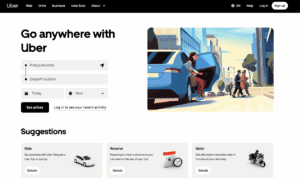If you have big plans for your business, you’ll be in the market for a domain name to match. Cheap, everyday domains are unlikely to work for you, which is why you’ll need to get your head around the world of premium domain names, as NameExperts.com Principal Joe Uddeme explains.
Domain names are the ultimate authority on the web. They can make or break any business with an online presence.
It’s necessary to pick a suitable domain name if you want customers to discover your website with little stress. Most individuals and businesses understand this rule, and that’s why there’s significant demand for the class of domain names known as premium domains.
There are various considerations to what constitutes a premium domain, but the most important thing to know is that they’re often short, catchy, and memorable.
Premium domain names give you greater recognition on the web. If you’re serious about your business, you’ll want to buy one of these pieces of prime digital real estate for your website.
Key Takeaways
- What makes a premium domain name
- Valuations of a premium domain name
- Long-term financial growth possibilities
- How to buy a premium domain name
What makes a domain name Premium?
The factors that contribute to making a domain name premium include:
Trustworthy TLD
The top-level domain (TLD) refers to the string of characters at the end of a domain name. The most popular ones include .COM, .NET, and .ORG.
There are thousands of TLDs available on the web, and some of them are obscure, e.g., .WOW, .TODAY, and .DOT. Any domain name having such TLDs will hardly or, if ever, be considered premium because people rarely encounter them and thus tend to be skeptical when they do.
Most premium domains end with the popular TLDs that customers trust. The best choice for one would be the .COM TLD.
Length and Brevity
A premium domain name is usually as short as possible. Overly long domain names can be difficult to memorize, so they can scarcely be considered premium – no matter how great their combination of words is. For example, are you more likely to remember (and visit) boats.com or greatboatsforsaleonline.com?
Conciseness is also a vital factor in premium domains. Hyphens or punctuations can make domains difficult to remember, so you want to avoid them.
Generic
Premium domain names typically contain generic words that are easy to recall and understand. The more common a domain name sounds, the higher the value it commands.
Take, for example, Insurance.com, which sold for $36 million, and VacationRentals.com, which sold for $35 million.
It’ll be a great advantage if your company’s domain name consists of a word broadly relating to your industry. If so, it’ll be easier to make a lasting impression on customers’ minds when advertising.
For example, Cars.com is a leading automotive classifieds site with hundreds of millions of dollars in annual revenue. The relationship between its domain name and its business carries weight.
Keywords/Search Engine Optimization
Search engines are the biggest medium through which internet users discover websites. Hence, premium domains typically correspond with common search terms. AirlineTickets.com, CarRentals.com, and MovieTickets.com are typical examples of premium domains drawing their significance from search engine optimization.
They also prove that a domain name doesn’t have to be a single word to be considered premium.
Why buy a premium domain name?
There are numerous good reasons to buy a premium domain name, but they all converge on one motive: to bring about more business. Companies would not spend sizable sums on premium domains if they weren’t bringing good returns.
The justifications for buying premium domain names include:
Credibility
A premium domain gives your brand more credibility in your industry. A domain name can provide a hint of how serious your business is about flourishing. Don’t believe it?
Try pitching to business professionals or prospective investors with a questionable domain. You’ll be made jest of or continually dismissed, which isn’t a favorable situation to be in.
The domain name you pick also goes a long way in determining the quality of media coverage your business can get. News and industry publications are more receptive to premium domains than non-premium ones.
Brandable
It’s more feasible to build a thriving brand around a premium domain than a non-premium one. A premium domain is usually short and catchy and, therefore, can stick to customers’ minds more easily.
Many people don’t pay much attention to advertising, so it’s wise to give them something memorable in the shortest possible time.
A premium domain has a substantial competitive edge over non-premium domains in enticing customers to patronize a business.
Stripe.com, Amazon.com, and Uber.com are examples of businesses whose highly brandable domain names have contributed greatly to their success.

Improved search engine ranking
The battle to rank high on search engines is very fierce. There are millions of websites competing for limited space on the first page, so you need every possible competitive advantage.
A premium domain is more likely to rank higher on search engines than other domains.
Investment
A domain name is not just a tool but also an asset. There would not be a big domain flipping market if this wasn’t true. The past two decades of commercial internet have seen many domain investments reap big windfalls for their owners.
A premium domain can appreciate in value over short periods of time due to high demand. Hence, it’s a proper medium to park some cash with hopes of getting a significant return.
Let’s say a business with a premium domain fails. That domain can be sold for a high price and give some comfort to the owners of the faltered business. Check out our guide to the most expensive domain names ever sold for an eye-opening introduction to this high-value world.

Is it worth it to buy a premium domain?
In many cases, buying premium domain names for your business can be a great decision. A good domain name corresponds to a solid online identity, which is valuable for any business.
The competition on the internet is intense, so you should strive to differentiate yourself with a premium domain name.
One of the best online business tactics is to buy a premium domain in a booming industry – mental health and artificial intelligence, for example. Such a domain is likely to bring about a great deal of organic growth for your business – or could have a phenomenal resale value.
Do domain names increase in value?
Very often, yes. A domain name you buy may not be in vogue at the moment, but no one is sure of what the future holds. That domain could be useful in a burgeoning industry, making an organization pay a big sum for it.
Another way for a domain to increase in value is if an established business decides to launch a product or rebrand with that name.
For example, when Facebook, the social media giant, rebranded to Meta last year, it had to buy the Meta.com domain name.
The price it paid for the domain wasn’t disclosed, but the company separately bought some trademarked assets relating to the name for $60 million, giving a hint of how valuable the domain was.

How much is a premium domain name?
A premium domain name can cost between hundreds and millions of dollars. There’s no definitive price range, as it mostly lies on arbitrary terms between the buyer and the seller.
If you’re buying premium domain names directly from a domain registrar, you should expect to pay a few hundred or thousands of dollars. It gets more expensive when there are direct negotiations involved and the value of the name is irrefutably higher.
Some domain owners demand tens or hundreds of thousands for their domains. We advise you to hire a professional domain broker if you’re to buy a premium domain name directly from the seller.
How to buy a premium domain name
You can buy a premium domain name directly from a domain registrar or the owner. Many registrars offer premium domains to their customers, e.g., GoDaddy, Domain.com, and BuyDomains.
There are also sites specializing in auctioning expired or deleted domain names, e.g., Sedo.com.
To buy a premium domain name directly, you can sign up on a dedicated marketplace (NamePros, Atom.com, etc.) linking sellers up with prospective buyers like you.
An alternative is to hire a domain broker to find the identity of an existing domain owner and negotiate a possible deal. There are many advantages to using a domain name brokerage service, including saving time and money.
Name Experts, for example, has access to a wide network of buyers and sellers. We’ll also handle the legal, escrow and negotiation on your behalf – resulting in a faster, hassle-free process that keeps you safe and protected.
About the author
Joe Uddeme is Director and Principal of Name Experts, one of the world’s leading domain name brokerage services. He has overseen domain name sales and acquisitions totaling more than $150 million and is renowned worldwide as a go-to expert in buying and selling premium domains. Using his years of experience, negotiation skills and little black book of contacts, Joe is an expert at helping clients secure premium domain names. Contact him at: [email protected]













